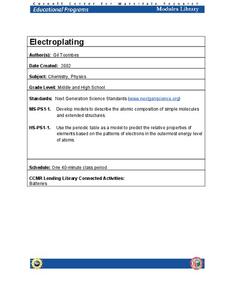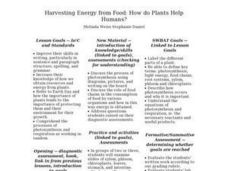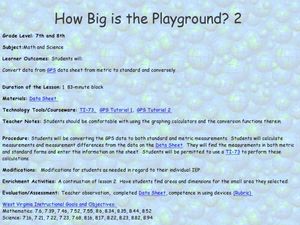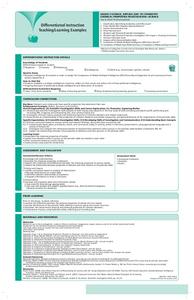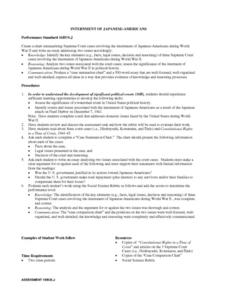Curated OER
Properties of Magnetic Forces
Students explore what a magnetic force is and what kinds of objects are attracted to a magnet. They use a magnet to sort objects taht are and are not attracted to a magnet. Students then explain why the objects were or were not...
Curated OER
Soils
Students apply knowledge of soil, environmental impacts, economics, multiple human demands, and use given data for a proposed scenario in making land use decisions. They debate land use issues and/or scenarios and discuss a case study.
Cornell University
Catapults
Ready, aim, fire! Launch to a new level of understanding as scholars build and test their own catapults. Learners explore lever design and how adjusting the fulcrum changes the outcome.
Cornell University
Constructing and Visualizing Topographic Profiles
Militaries throughout history have used topography information to plan strategies, yet many pupils today don't understand it. Scholars use Legos and a contour gauge to understand how to construct and visualize topographic profiles. This...
Cornell University
Electroplating
Silver pennies and copper nickels are made possible by applying some chemistry. Learners use electrolysis to coat a penny with zinc sulfate and a nickel with copper sulfate. Their investigation builds an understanding of electroplating...
Curated OER
Harvesting Energy from Food: How do Plants Help Humans?
Beginning botanists view slides of plant vascular tissue. They watch Magic School Bus Gets Planted, which you can find online, and then write a summary of what they have learned about plants. This instructional activity could be used...
Cornell University
Beam Focusing Using Lenses
Explore optics using an inquiry-based experimental approach! Young scholars use a set of materials to design and build a unit capable of focusing a beam of light. They experiment with different lenses to determine the best approach to...
Cornell University
Bridge Building
Bridge the gaps in your knowledge of bridges. Individuals learn about bridge types by building models. The activity introduces beam bridges, arch bridges, truss bridges, and suspension bridges.
Cornell University
Atomic Bonding
Explore the connection of surface area to bonding within atoms. Learners complete lab investigations to model changing surface area with different sizes and concentrations of atoms. A flour fireball demonstration follows the labs to...
Curated OER
How Big is the Playground: Creating a Map
Students create a topographical map of an area outside of the school. In this mapping lesson, students compile data on angles, distances, and key landmarks for a predetermined area on the school grounds to create a map using Geometer's...
Curated OER
How Big Is The Playground?
Students calculate the standard and metric measurements of a playground. In this measurement lesson plan, students use GPS coordinates and graphing calculators to determine the dimensions of an area outside of the school in both standard...
Curated OER
Flutterings and Flowers
Fourth graders investigate the significance of natural resources and the habitats of butterflies. They create a list of their own favorite foods, then watch a video about habitats. Students identify things in the video that animals and...
Curated OER
Cell Works
Young scholars observe slides of cork cells and discuss the use of microscopes. They view a power point presentation on "Looking Inside Cells" and take notes aligned with the PPT presentation. They collaborate with a partner to create an...
Learning to Give
It's Never Too Late: Air Quality
What are the causes and effects of pollutants on the quality of the air we breathe? Groups research emission standards, emission controls, career opportunities in the area of air quality control, and things government and individuals can...
MENSA Education & Research Foundation
The Moon: Earth’s Dependable Neighbor
Scholars become experts on the moon, its phases, and craters with a series of lessons, activities, and extension opportunities. Learners' expert level of knowledge includes moon facts, how moon craters are created, the ability to...
EduGAINs
Chemical Properties Investigation
This lesson demonstrates differentiated instruction at its best. Over the course of 2-3 class periods, young chemists have the opportunity to gain a thorough understanding of metals and their chemical properties from a variety of...
Science 4 Inquiry
Eukaryotic Cells: The Factories of Life
Eukaryotes include humans, animals, and plants. Scholars learn about the parts of eukaryotic cells. They design models of a store and match the correct function of each part to the function of a part of the cell. They review their...
Houghton Mifflin Harcourt
The Progressive Era: Muckrakers
Using Upton Sinclair's The Jungle, guide your class in the process of identifying unknown terms using context clues and formulating text-based answers. The lesson plan includes a useful worksheet incorporating scaffolding questions on an...
Teach Engineering
See the Genes
"If you can't explain it simply, you don't understand it well enough" - Albert Einstein. The sixth installment of a seven-part series teaches young scientists about the importance of being able to communicate scientific research and...
American Chemical Society
Colors Collide or Combine?
As part of a unit investigating the dissolving of M&Ms® candy coating, this lesson examines whether or not the different colors combine. There are no new concepts revealed in this particular lesson, but learners will see that the...
Curated OER
Animal Diary
Students create a diary of an animal. In this creative writing lesson plan, students read the book Diary of a Worm and conduct a brief research session on their animal. Students fill in a template with facts and create an animal diary.
Curated OER
Following the North Star
Students give examples of the impacts of science and technology on the migration and settlement patterns of various groups. They draw stars
explaining how the North Star was used to give directions on the Underground Railroad.
Curated OER
Debate: Is Cheerleading a Sport?
Learners research how women are perceived in sports. They debate the issue of whether cheer leading should be considered a sport and are scored on student made rubrics.
Curated OER
Internment of Japanese-Americans
Learners assess the significance of a watershed event in the political history of the United States . They identify events and issues associated with the internment of Japanese-Americans as a result of the Japanese attack on Pearl Harbor...






